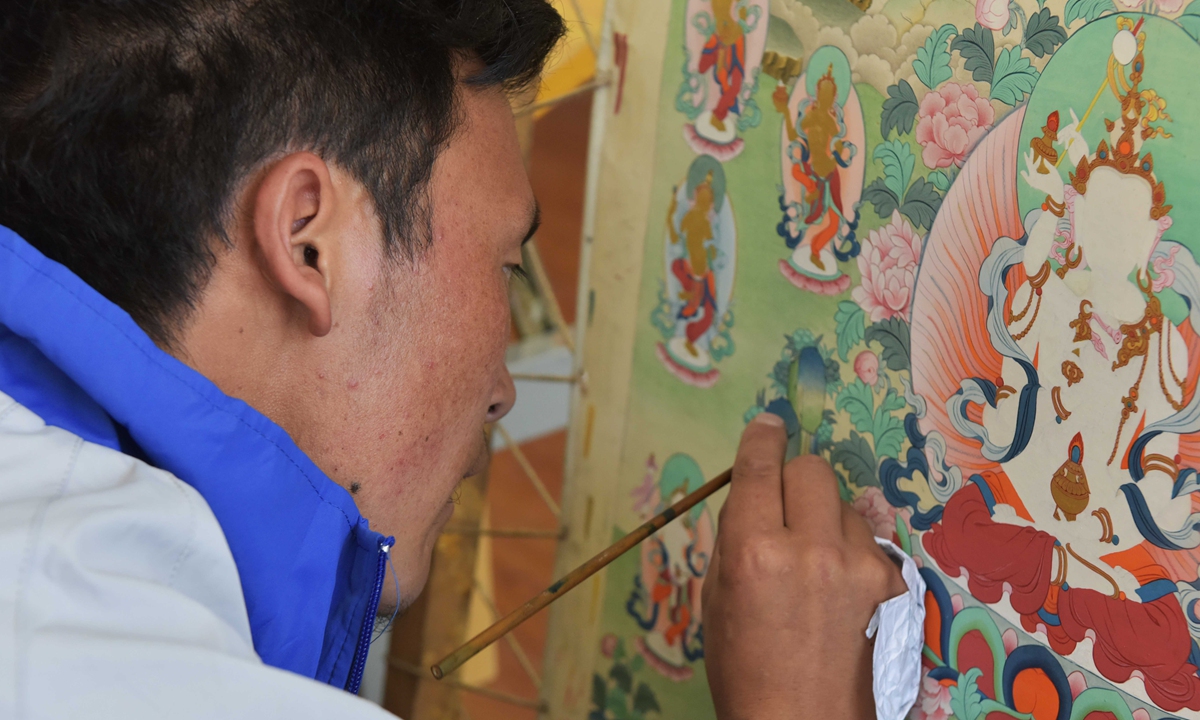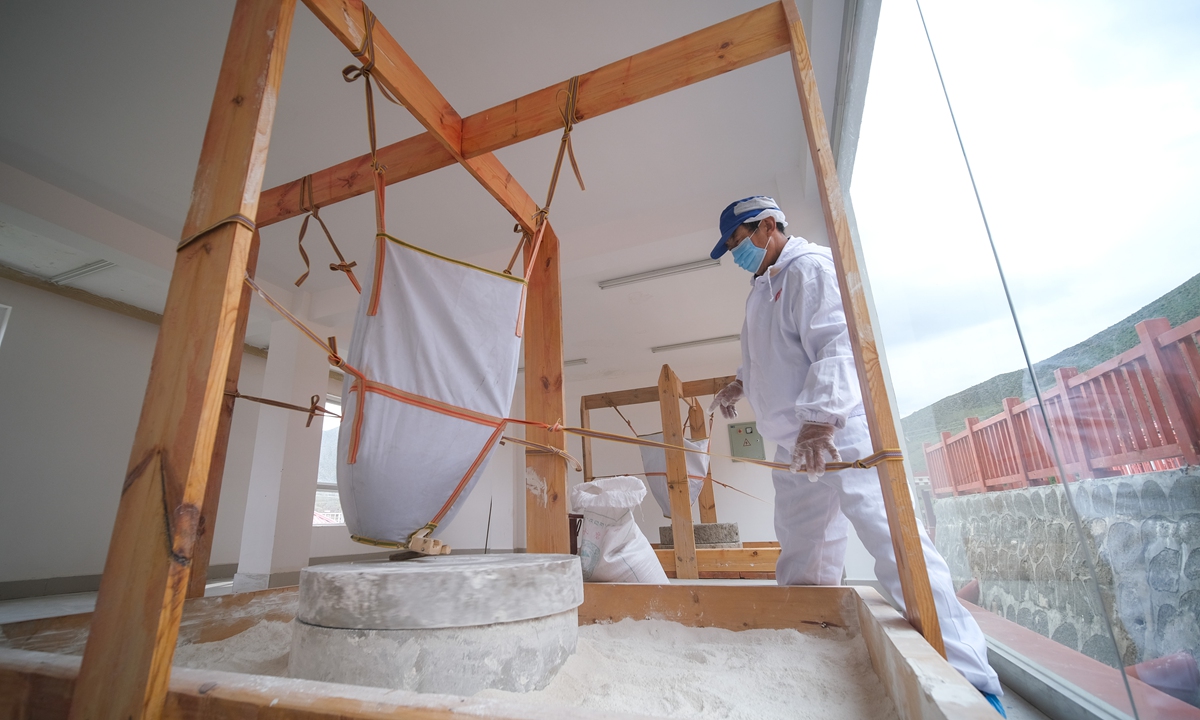Preferable policies, talent-friendly measures stabilize employment in Tibet
By Xie Wenting in Qamdo Source: Global Times Published: 2020/8/20 20:58:27

The natural scenery in Qamdo, Tibet. Photo: VCG
After graduating from a vocational and technical college in Wuhan, Central China's Hubei Province, Wujin Dunzhu, chose his future career without any hesitation - returning to his hometown of Qamdo, Southwest China's Tibet Autonomous Region, to start his own business.
"Qamdo has preferable policies toward college students who aspire to be entrepreneurs. This is also my hometown. So I did not have to hesitate about returning home to set up my own business," he told the Global Times.
College students planning to set up their own business in Qamdo receive 60,000 yuan ($8,663) as start-up capital as well as subsidies for rent, water and electricity from the local government. The subsidy can be as high as 24,000 yuan a year, according to Wujin Dunzhu.
Wujin Dunzhu returned to Qamdo at the end of 2017. He opened a barber's shop and now plans to open the first automobile 4S store in the city in the near future. "I'm satisfied with current situation," he said, noting most of his classmates who studied outside Tibet also returned to the region upon graduation.
"Compared with working in big cities outside Tibet where competition is so intense, working in Tibet is more attractive to us as the region has our familiar environment and it develops at a fast speed," he said.
In the Minchang Innovation Park where Wujin Dunzhu's company is based, nearly 200 college students like him work there. When the Global Times reporter visited, young people were seen energetically engaged with their jobs with many living out their entrepreneurial dreams.
Currently, 202 companies have settled in the park, employing more than 2,000 people. These companies cover a wide range of industries including medicine, food and trade.
The innovation park is an epitome of how the region creates jobs and achieves poverty alleviation. All counties and county-level districts in Tibet were lifted out of poverty in 2019.
Due to the preferable policies implemented toward people setting up companies coupled with support from other parts of the country, job creation is on the rise in the region. The policies have enabled both college students and residents who used to make a living on herding to find new job opportunities ensuring a stable family income.
In addition to encouraging Tibetan students to start their own business, the Global Times learned that the local government also rolled out other measures including attracting investment and talent from more developed areas of the country, and opening more training workshops for residents.

A young apprentice learns to paint Thangka, a traditional Tibetan Buddhist art form, at an intangible cultural heritage workshop in Qamdo. Photo: cnsphoto
Attracting talent
Minchang Innovation Center sits in the Qamdo New Area, about 30 kilometers from the city center. As of May 2020, 831 companies registered in this new area with a registered capital of 22.74 billion yuan ($3.2 billion). In 2019, the GDP of the Qamdo New Area reached 1.95 billion yuan.
Mei Fangquan, member of the standing committee of the municipal Party committee of Qamdo, said the local government guided the companies in the new area to employ the city's local residents. Native residents represent more than 40 percent of the total employment in Qamdo New Area.
These employment opportunities are not only created by Tibetan people themselves, but also by companies coming to Tibet from other parts of the country. Among them, Tianjin companies play a major role. Tianjin is one of the cities designated to assist Qamdo's development.
Hu Xiangzheng, a professor with Tianjin University of Science and Technology set up a company in the new area back in 2017. He is a special talent who was introduced to Qamdo by the local government.
Hu's company makes use of herbs grown up in Tibet to make medicine. After more than two years' preparation, the medicine is about to put into production.
Hu told the Global Times it takes a comparatively longer time to do preparation work in Tibet. One of the reasons is the region has a higher environmental protection requirements. "We cannot use the organic solution here. Also, the supporting facilities are not as complete as those in Tianjin. So we need to keep adjusting our technologies," he said.
Hu spoke high of the local government's policies and attitudes in welcoming talent outside the region. He also received a special subsidy for setting up his company.
But it's not just entrepreneurs who are reaping the benefits of Tibet's poverty reduction.
Luosong Danzeng has worked at the Guangyulimin Medicine Company in the New Area for one year.
He said he quite liked the job. His family earned their living as farmers, which he said was not easy. Working at the medicine company, he can save more than 2,000 yuan every month for his family.
In the new area, several Tibetan workers approached by the Global Times reporter said in broken Putonghua they appreciated having job opportunities which greatly improved their lives. The industrial project has given them economic empowerment, allowing them to earn thousands of yuan a month, much higher than their previous income.

A worker grinds zanba at a large highland barley processing factory in Qamdo. Photo: cnsphoto
Training workshops an efficient tool in targeted poverty alleviation
In Karuo district in Qamdo, job skill training workshops serve as an important platform in the targeted poverty alleviation campaign.
According to the local civil affairs bureau, it has hosted 107 workshops on skill training and three sessions of entrepreneurship training, with a total of 7,110 people trained and 4,621 people employed.
The employment rate of farmers and herdsmen reached 64.99 percent in the district. A training center was also set up in April 2018.
The programs in the training center include colored painting, sewing, cosmetology, cooking, machinery repair, hospitality classes, among many others.
Dizeng Zhuoma is a student of a sewing class. She was once unemployed.
As a new clothing factory was opened near her home, she said she hoped to get a job there, so she went to the training center to learn sewing. If her studies go smoothly, she will complete the lesson by the end of August, and can sign a contract with the factory.
For Renqing Yongzong, this is the third time she has taken the training lessons. This time, she applied for the waitress course. She previously had learned hand knitting and skills for being a cleaner.
After the training course, she found a job as a cleaner in the community where she lived in and made more than 2,000 yuan a month. Now she decided to learn more skills to boost her income.
"To learn more is always a good thing. I hope to find a waitress job after training. I heard that being a waitress can earn more than 3,000 yuan," she said.
Newspaper headline: Homebound happiness
Posted in: IN-DEPTH